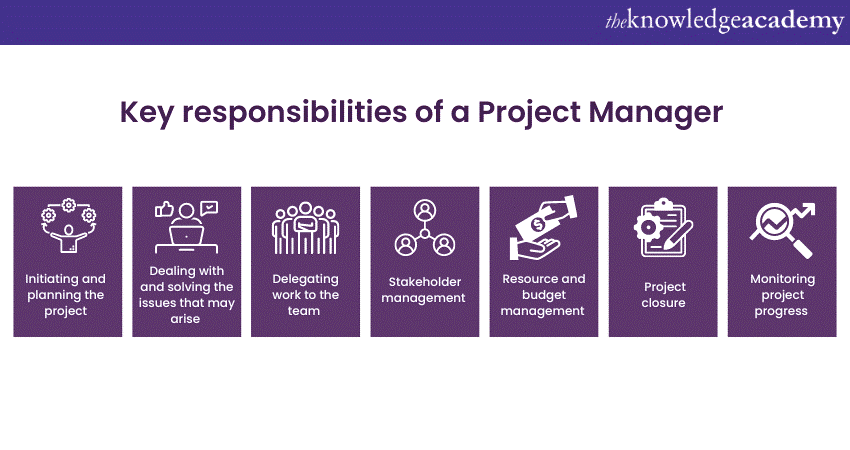We may not have the course you’re looking for. If you enquire or give us a call on 01344203999 and speak to our training experts, we may still be able to help with your training requirements.
Training Outcomes Within Your Budget!
We ensure quality, budget-alignment, and timely delivery by our expert instructors.

In today's dynamic business environment, Project Manager Roles and Responsibilities have become increasingly crucial. They play a central role in successful project execution, ensuring that goals are met, resources are utilised efficiently, and stakeholders' expectations are fulfilled. Project Managers’ Roles and Responsibilities are plentiful, but they are also compensated well in return.
According to Glassdoor, in the UK, the average salary of an entry-level Project Manager Professional is £45,335. As they grow, so do the Project Manager Roles and Responsibilities, as well as the salaries. This blog will explore the Roles and Responsibilities of a Project Manager in detail and understand the role they play in a project’s success.
Table of Contents
1) What is the role of a Project Manager?
2) Project Manager Responsibilities
3) What makes a good Project Manager?
4) Conclusion
What is the role of a Project Manager?
Being at the helm of a project, a Project Manager takes up multiple roles. Most importantly, they play the role of a leader, managing the project and the team effectively. They also play the role of Stakeholder Manager, which requires them to establish relationships with relevant stakeholders, manage their expectations, and address any conflicts that may arise.
Essentially, they align project objectives with the overall business strategy, ensuring readiness for change and maximising the chance of success. While these are the primary roles a Project Manager takes up, there are a lot of responsibilities that they have.
Project Manager Responsibilities
A project usually involves many moving parts, and naturally, a Project Manager fulfils many different responsibilities. The responsibilities can be as mundane as taking regular updates from the team to meeting with stakeholders to align business and project goals.

1) Initiating and planning the project
2) Dealing with and solving the issues that may arise
3) Delegating work to the team
4) Stakeholder management
5) Resource and budget management
6) Project closure
7) Monitoring project progress
Here is a detailed breakdown of all the responsibilities of the Project Manager.
Learn the fundamentals of Project Management and start your journey to becoming a Project Manager with the Introduction To Project Management Certification Course.
Initiation and planning of the project
Project initiation is a critical phase where managers define the project's goals, objectives, and scope. They collaborate with stakeholders during this stage to understand their requirements, expectations, and desired outcomes. The Project Manager conducts a comprehensive analysis to evaluate the viability of a project and identify potential risks and challenges. They gather essential information and data, establishing a robust foundation for project planning and execution. They consider factors like resource availability, budget constraints, and technical feasibility. During the planning phase, Project Managers delve into how the project will be carried out, setting the roadmap for achieving project objectives.
Project Managers usually carry out these tasks as a part of this responsibility:
a) Breaking down the project into manageable tasks
b) Establishing hierarchies and dependencies of each activity
c) Estimate the resources required such as personnel, equipment, materials, cost, etc.
d) Create a realistic and achievable project schedule.
e) Identify potential risks
f) Setting standards for the project
g) Budget planning
By carefully defining the project's scope, goals, and objectives, Project Managers set the stage for successful execution and lay the groundwork for subsequent planning and implementation activities.
Learn how you can leverage the capabilities of Jira to effectively manage your project with our comprehensive Jira Masterclass.
Leading the team
A significant responsibility of Project Managers is to provide effective leadership to the project team. They play a pivotal role in guiding and inspiring team members to perform at their best and achieve project objectives. As a “people manager”, here are key aspects of this responsibility.
a) Communicate the project's goals and expectations, aligning team efforts with the overall vision.
b) Fostering a positive team culture, encouraging collaboration, and recognising team members' contributions.
c) Defining clear roles, assigning responsibilities, and promoting accountability within the team.
d) Establish open communication channels, facilitate regular meetings, and ensure transparent information flow among team members.
e) Addressing conflicts promptly, promote constructive dialogue, and seeking practical solutions.
f) Providing guidance, support, and opportunities for professional growth to enhance team capabilities.
g) Make informed decisions, involve the team when necessary, and aligning choices with project objectives.
Execution
The Project Manager is responsible for and participates in both the carrying out and the monitoring of each of the project phases. This includes keeping continuous communication going with the team members and the beneficiaries of the project. This helps make sure the project is executed as planned.
Managing time
Time is the scarcest resource in Project Management. As the foundation of the whole project depends on it. You need to be able to set and negotiate deadlines for your team members. Effective time management would be done by strategic planning and scheduling. Divide up tasks and set a deadline for each of your team members.
The early identification of bottlenecks is also crucial in the timely completion of a project. Skilful resource forecasting allows you to anticipate any problems related to resources and handle them without difficulty.
Pro Tip: Motivate your team members to follow the Pomodoro Technique. This simply means they concentrate for 25 minutes and then enjoy a 5-minute break. This technique therefore prevents burnout of the team members and makes them more productive.
Monitoring the project progress
Project monitoring is a key component of the Project Manager's work. It requires a repeated review and quantification of the project's performance to make sure it keeps up with its goals and objectives. Key aspects of monitoring project progress include:
a) Project Managers track the essential project milestones and deadlines, detecting potential delays or obstructions to keep the project on schedule.
b) They compare the actual progress with the planned schedule and implement the rectifying actions to keep the project timelines relevant.
c) They keep track of project expenditure, guaranteeing efficient use of the resources and resolving deductions from the approved budget.
d) They continuously analyse the risk level of a project and prevent negative impacts by applying proactive mitigation strategies.
e) They ensure that the deliverables meet their standards, perform inspections and implement necessary correction measures.
f) These parties ensure consistent flow of information to stakeholders, by highlighting progress, the challenges & what adjustments that are made to make the channels of communication effective.
Solving issues and challenges that arise
The biggest responsibility of a Project Manager is to solve any issues that might arise during the project actively. They play a pivotal role in maintaining project momentum and ensuring successful project outcomes. By effectively solving issues and challenges, Project Managers keep the project on track, mitigate risks, and ensure timely delivery.
Their problem-solving skills, stakeholder engagement, and decision-making abilities are crucial in resolving issues and ensuring successful project outcomes.
Learn how to manage risks and project constraints effectively with Managing Project Risks Masterclass.
Managing documentation and reports
Project Managers are responsible for overseeing the management of documentation and reports throughout the project lifecycle. They establish document control procedures to organise and maintain project-related documents, ensuring easy access and accuracy.
They are responsible for generating accurate and tailored reports to give stakeholders an overview of project progress, milestones, risks, and issues. They ensure compliance with organisational standards and industry regulations. They also promote knowledge sharing by capturing lessons learned and fostering continuous improvement through project insights. Effective management of documentation and reports enables transparency, facilitates communication, and supports informed decision-making throughout the project.
Project closure
Project Managers oversee the final stages to ensure a well-structured closure as a project nears completion. They verify the completion of all project deliverables, ensure documentation and records are finalised and properly archived, and communicate the project's closure to stakeholders.
Project Managers coordinate the release of resources, conduct project evaluations to assess performance, capture lessons learned, and celebrate the achievements of the project team. A thorough project closure provides valuable insights for future projects, facilitates knowledge transfer, and fosters a sense of accomplishment among team members.
What makes a good Project Manager?
Project Managers play a pivotal role in guiding projects to success, ensuring that teams are cohesive and objectives are met efficiently. The hallmark of an effective Project Manager lies in a blend of clear communication, leadership, and technical skills, which are critical for steering projects through complex landscapes.
Essential skills include streamlined communication to keep everyone informed and aligned, a positive outlook to motivate the team, and adept problem-solving to navigate challenges. Additionally, successful Project Management demands the ability to delegate tasks wisely, prioritise work effectively, and foster a collaborative environment. Key attributes also involve managing time efficiently, focusing on stakeholder needs, and driving the team towards innovation and creativity.
Embodying these skills enables Project Managers to not only achieve project goals but also do so in a way that promotes productivity, stakeholder satisfaction, and team motivation, distinguishing great Project Managers in the business realm.
Conclusion
The Role of Project Managers is crucial in driving project success through effective leadership, communication, and strategic management. The Project Manager They are key drivers of innovation, transformation, and continuous improvement, making them invaluable assets in today's dynamic business landscape. This blog addressed the roles and responsibilities.
Develop your skill set as a Project Manager and learn the essentials of Project Management with our Project Management for Non-Project Managers Course.
Frequently Asked Questions

Project Management skills combine the necessary hard and soft skills for efficiently planning, executing, and concluding projects. Key skills include effective communication, leadership, problem-solving, and risk management, alongside proficiency in relevant software and methodologies.

Established Project Managers aiming to advance their careers often consider roles like Chief Operating Officer (COO) or other senior management positions, which vary by title across industries.

The Knowledge Academy takes global learning to new heights, offering over 30,000 online courses across 490+ locations in 220 countries. This expansive reach ensures accessibility and convenience for learners worldwide.
Alongside our diverse Online Course Catalogue, encompassing 17 major categories, we go the extra mile by providing a plethora of free educational Online Resources like News updates, Blogs, videos, webinars, and interview questions. Tailoring learning experiences further, professionals can maximise value with customisable Course Bundles of TKA.

The Knowledge Academy’s Knowledge Pass, a prepaid voucher, adds another layer of flexibility, allowing course bookings over a 12-month period. Join us on a journey where education knows no bounds.

The Knowledge Academy offers various PMP Training, including CAPM Certification Training, PMI-ACP, and PMP exam prep. These courses cater to different skill levels, providing comprehensive insights into Project Planning.
Our Project Management Blogs cover various topics related to Project Management, offering valuable resources, best practices, and industry insights. Whether you are a beginner or looking to advance your Project Management skills, The Knowledge Academy's diverse courses and informative blogs have you covered.
Upcoming Project Management Resources Batches & Dates
Date
 Project Management Certification Course
Project Management Certification Course
Fri 21st Jun 2024
Fri 19th Jul 2024
Fri 16th Aug 2024
Fri 13th Sep 2024
Fri 11th Oct 2024
Fri 8th Nov 2024
Fri 13th Dec 2024
Fri 10th Jan 2025
Fri 14th Feb 2025
Fri 14th Mar 2025
Fri 11th Apr 2025
Fri 9th May 2025
Fri 13th Jun 2025
Fri 18th Jul 2025
Fri 15th Aug 2025
Fri 12th Sep 2025
Fri 10th Oct 2025
Fri 14th Nov 2025
Fri 12th Dec 2025







 Top Rated Course
Top Rated Course



 If you wish to make any changes to your course, please
If you wish to make any changes to your course, please


